This semester the PSC has faced a new level of challenges – and members have thought hard about how to respond. CUNY funding, the labor movement, and our own working conditions have been under assault, often in ways that would have seemed unthinkable just a few years before. Yet almost everyone at CUNY is overworked, and finding the time for union action in an already busy schedule is difficult. But PSC members have responded to the challenge in many different ways. Here are some of their stories.
Fighting for a Writing-Centered Pedagogy
Glenn Petersen
Professor of Anthropology
Baruch College
This year Glenn Petersen helped lead faculty resistance to the imposition of jumbo classes in several departments at Baruch. For college administrators, switching from writing-intensive introductory courses with caps of 32 students to giant classes with as many as 114 students per faculty member looked like an easy way to save money in hard times. A large number of adjuncts would have been eliminated and more work squeezed out of full-time faculty.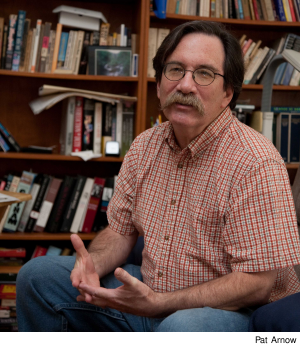
Petersen, who chairs Baruch’s Department of Sociology and Anthropology, worried that such a move would undermine a writing-centered pedagogy that challenges students to think in new ways and argue for their ideas, not simply memorize facts. He recalled lying awake at night, thinking he would have to retire if required to teach the proposed jumbos.
Along with other faculty, Petersen spoke out. “We communicated that we weren’t going to destroy teaching models we had developed over many years,” he told Clarion. In the face of widespread opposition, Baruch’s administration backed away from the plan before the end of Fall semester.
DIRECT ACTION
But with more cuts looming in CUNY funding, Petersen decided more had to be done. So he traveled to Albany to push for renewing the “millionaires’ tax,” joining other PSC members in meeting with legislators on March 22. And on March 23, he took part in a union-sponsored direct action.
Petersen was among 33 faculty, staff and students arrested in the State Capitol for blocking the entrance to the office of Gov. Andrew Cuomo, to oppose the governor’s plan to give a tax break to New York’s wealthy while cutting CUNY funds by $112 million. More than 150 PSC members and community allies took part in the demonstration, part of what the Associated Press called “an uncommon level of protest” over this year’s budget.
“I took a stand for something I believed in, and did something that needed to be done,” said Petersen. “My campus has already had its budget ripped to shreds, and further cuts will definitely hurt the quality of instruction. So I just couldn’t see this being done to my students without resisting it.”
It was not the first time Petersen had put himself on the line for his beliefs. A former Navy flyer in Vietnam, he later turned against the war and tossed his medals over the White House fence in a 1971 protest alongside future presidential candidate John Kerry.
“For the rest of my life,” Petersen said, “I’ve felt the importance of demonstrating the force of one’s opposition by one’s actions when something is just wrong.”
New Opportunities for Solidarity in the Public Sector
Michelle Fine
Distinguished Professor of Psychology
Graduate Center
For more than 20 years, Michelle Fine has studied how poverty and opportunity are distributed by race and class. Today she sees public policy shifting the scales in the wrong direction.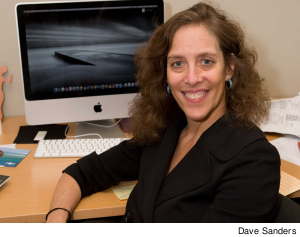
“I live in New Jersey and work in New York, and in both states the inequality gaps are enormous and growing,” said Fine. “Yet both governors have refused to equitably tax the rich and, by so doing, have shifted the financial burden onto poor children, poor students and our public institutions.”
‘A PRIVATIZING VIRUS’
“There’s a privatizing and punishing virus among us,” Fine observed. To oppose it, Fine has stepped up her involvement with PSC protests this semester. On March 23, she was one of nearly three dozen CUNY faculty, students and staff who took part in a sit-in at Gov. Cuomo’s Albany office, where they were arrested for blocking the entrance.
For Fine, it was a way to give voice to public opposition to Cuomo’s deep cuts in CUNY’s operating budget and in TAP funding for students. “The union has been a key conscience in keeping CUNY public,” said Fine, the coauthor or editor of nine books including Beyond Silenced Voices: Class, Race, and Gender in United States Schools. “It seemed important for those of us who have secure jobs to speak out.”
Fine, who also joined the union’s May 5 rally and march for a fair contract, sees the attack on CUNY as a part of a larger push to close public spaces throughout society. But the breadth and severity of the attack, she said, open new opportunities for solidarity.
This hit home when the State Police, who arrested Fine and her colleagues on March 23, quietly thanked them for doing what police could not.
“The whispers in the ears by the police were such a confirmation that the conditions are ripe for public-sector solidarity,” said Fine. “It feels like we’re building momentum in the state and across the nation around a solidarity between unions, students, parents, community organizations, upstate and downstate. It’s cross-generational, multiracial and multiethnic,” she told Clarion. “You’re beginning to see alliances that recognize that unless we work together, we’re all going to be privatized out of our public institutions.”
‘It’s Time to Rise to the Occasion.’
Lizette Colón
Academic Counselor
Hostos Community College
Lizette Colón doesn’t go to a protest by herself. In the week leading up to the PSC’s May 5 rally for a fair contract and full funding for CUNY, Colón visited five classes and spoke to faculty and students about the importance of getting informed and involved.
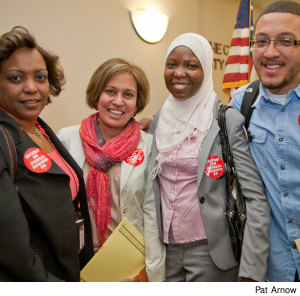 |
With Mayor Michael Bloomberg proposing a budget that would shortchange community colleges by $52.6 million, Colón said, “my message was that it’s time to show that you really care about your education and to make your presence felt.” The PSC chapter chair at her campus, Colón also reminded former students she worked with as an academic counselor, about the rally and had bilingual flyers placed in campus toilet stalls. The Student Government Association provided free subway cards to students traveling to the protest.
At Hostos, 72% of students are members of households that earn less than $30,000 per year. If tuition goes up, students taking remedial courses would be especially hard hit, Colón said, as their TAP money would be more likely to run out before they complete their associate’s degrees. “We have to keep vigilant so that educational possibilities will stay real for everyone who needs them,” she said.
Colón thinks there needs to be wider participation by PSC members the next time the union calls a protest like the one on May 5. “It’s time to rise to the occasion or we will have a lot fewer rights in a year or two,” she told Clarion.
Colón was back in Lower Manhattan on May 11, meeting with City Council members in the PSC’s annual “CUNY at the Council” grassroots lobbying day. The City budget’s new deadline is July 1.
Wisconsin Protests Caught His Attention
Gordon Tapper
Professor of English
LaGuardia Community College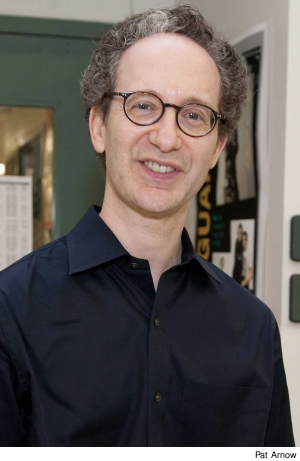
“I feel it’s important to have the union but I usually don’t have the time to get involved,” said Gordon Tapper, a LaGuardia professor of English, during the PSC’s May 5 rally for a fair budget and a fair contract.
Tapper said events in Wisconsin had caught his attention, and reminded him that being a union member allowed him to participate in a public debate in which otherwise he might not be heard.
“It’s a crucial moment. We have to build on the growing public backlash against the extreme right-wing agenda,” Tapper added. “We’re reaching a tipping point where people have to speak out.”
‘There are Alternatives to Austerity.’
Dave Bryan
Special Assistant to the Vice President for Student Affairs
Brooklyn College
Dave Bryan’s voyage from Brooklyn to Albany began in Madison, Wisconsin.
n the Office of the Vice President Students Affairs at Brooklyn College, was following nightly coverage on MSNBC of the battle in Wisconsin between Gov. Scott Walker and the state’s labor movement. Upset by what he saw, Bryan decided to do something he hadn’t done before: get involved in his own union.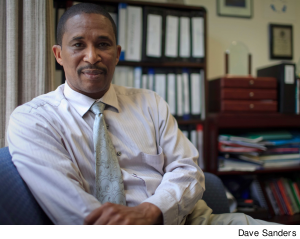
Bryan, who works i
“Taking away a group’s ability to decide what is in their self-interest is just not right,” Bryan said. “It could happen here, too. It was time for me to become active and learn as much as I can and share that with other people.”
On March 8, Bryan joined a 20-member PSC delegation that traveled to Albany for a day of grassroots lobbying with the union’s state affiliate, NY State United Teachers. The message his group conveyed, he said, was “that funding to CUNY should not be cut, and other solutions are possible” such as renewing New York’s “millionaires’ tax” that is set to expire at the end of this year. Bryan said that Clarion’s coverage of State revenue issues helped prepare the PSC members to make their case.
Bryan also joined a PSC delegation at the May Day protest at Foley Square, which drew thousands of supporters of worker and immigrant rights, and he told Clarion he intends to stay involved. “I’m going to keep on talking to colleagues on campus and to my friends and family, and let them know that there are alternatives to the austerity measures,” Bryan said.
Because Our Students Deserve Better
Donna Gill
HEO Assistant
Hunter School of Nursing
As her son was growing up, Donna Gill warned him about the importance of not doing anything that would risk getting arrested. On the night before the March 23 action in Albany, the tables were turned. Gill was one of 33 CUNY faculty, staff and students who volunteered to risk arrest while engaging in non-violent civil disobedience inside the State Capitol building. And Gill’s son reminded her of their past talks about not going to jail.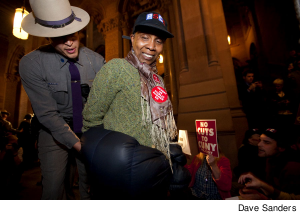
“It’s a scary thought,” Gill said during the bus ride up to Albany. “But the cause is worth it. CUNY is working on the bare minimum. There aren’t enough professors. The professional staff has been decimated. People are already overworked.”
CUNY is also suffering in ways that seem small but have a larger impact. Campus buildings are not being cleaned as frequently due to a reduction in support staff at a time when enrollment is increasing, she said – and that sends a message to students about the value society puts on their education.
Students deserve better, said Gill. She told Clarion that Hunter’s financial aid office, where she worked before moving to its School of Nursing, is straining to meet students’ needs. “How are we going to service students if there aren’t enough of us?” she asked.
Taking the Classroom Into the Streets
Tony Gronowicz
Adjunct Associate Professor of History
BMCC
Tony Gronowicz was one of more than 20 PSC faculty members who volunteered to lead open-air teach-ins during the May 12 protest that brought thousands of people to Wall Street (see page 12). Eight marches focused on issues such as education, housing, jobs, social services and immigration started at various points in Lower Manhattan and converged at the corner of Water and Wall. Teach-ins on the same themes were held along Water Street, soapbox-style, at different points on the sidewalk.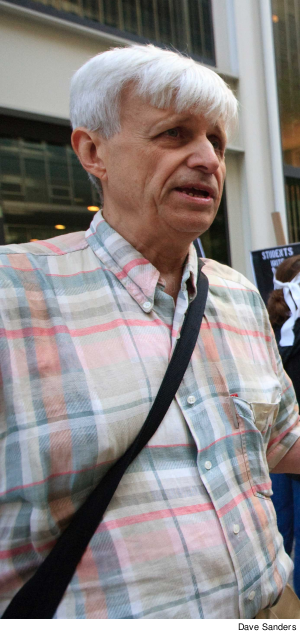
With 22 years’ experience as an adjunct faculty member at CUNY, Gronowicz was ready to do whatever was needed. “I can teach anything,” Gronowicz told organizers when they gave teach-in leaders their assignments. “Just tell me what you want.” Currently Gronowicz teaches history at BMCC, where he also serves as faculty advisor to the Student Government Association.
Author of Race and Class Politics in New York City Before the Civil War, Gronowicz said he finds teaching irresistible for the opportunity it gives to “conjure up the world.” Skills as an analyst and a performer are both required. On this day he wanted to relate education to both the roots and consequences of the Great Recession. “This crisis is permanent until average people are in positions of power instead of the plutocrats,” said Gronowicz, who finished fourth when he ran for mayor in 2005 as the Green Party candidate.
When his turn came, Gronowicz gave a presentation to a group of young protesters from the Queens Community House on economic inequality in New York and the loss of free tuition at CUNY. “I wish it [CUNY] was free,” said a young woman after Gronowicz finished. “Education should be free.”
‘Winding up’ Politicians Like a Clock
Terry Parker
Assistant Coordinator
Library Media Resources Center
LaGuardia Community College
Terry Parker sees the impact of austerity every day at LaGuardia’s library. The school’s enrollment has grown by 32% since 2006, but the library lost three full-time staff members this past semester due to early retirement. Part-time personnel have also been cut and the library increasingly relies on student interns to maintain the shelves.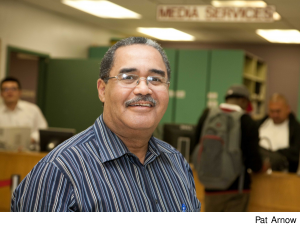
“We’re told we have to do more with less,” said Parker, who has worked at LaGuardia for 30 years. “But the truth is, we have to fight and push and argue for everything we get.”
On March 15, Parker joined hundreds of other CUNY and SUNY faculty, students and staff for a massive day of lobbying in Albany against budget cuts proposed by Gov. Cuomo and his Republican allies. Persistence is key to winning legislative victories, Parker said. He described politicians as being “like clocks that you have to keep winding up.”
As for why he made the trip, Parker said it was simple: “When the union puts out a call, I believe it’s important to respond. We need the union. And it can’t survive if the members don’t help out.”
______________________________
RELATED COVERAGE:
May 5 Rally Against Austerity
May 12 Message to Wall St.: ‘Tax the Rich, Stop the Cuts!’
Albany Budget Battle: CUNY Slashed, PSC Blocks Cuomo’s Door

